- Home
- Peter Carey
Jack Maggs Page 12
Jack Maggs Read online
Page 12
And what a place it was I had arrived at.
It was the smells that first of all impressed themselves, the smell of apples and oranges, and what may have been cinnamon, but in any case something sweet and strange. There were no smells of drains either, and it was this I’m sure that made the other smells the sweeter and gave me a feeling of almighty comfort.
It was a long double room with great glass doors which, I soon discovered, could be shut across the middle to make it into two separate rooms, but for now the doors were open, and the resulting space was bigger than Mary Britten’s quarters. In that damp, low-ceilinged little place, we shared one bed and two chairs between the three of us. Here there was enough upholstered seating to accommodate half the population of our little court. All around the room there were arm-chairs, sofas, chaises, love-seats—none of which I could have named for you, never having seen such things before. In my enchantment, I sat on each of them, each one, and it is only now, all these years later, that I reflect on the sooty mess I must have left behind.
But the door—I had Silas waiting for me at the door.
It is easy enough to say, open the back door, but he had not told me where the back door was. He did not know himself, of course, not from the inside—it was half a flight down from the kitchen, which was itself down a long and narrow staircase off another hallway.
Finally I found my way there in the dark, guided by Silas’s nervous whistle. But even having found the door, my work was not done. I was six years old, no locksmith, and I was at the chains and catches some five minutes with no other instruction than Silas’s curses on the other side of the door until the last chain fell away. Then the door swung in, and the knob knocked me in the middle of my forehead, and I was momentarily made insensible.
I woke to discover Silas slapping me around the head and pulling my ears, asking did I want him sent to America? I said I did not, and that I had done as well as I could, and that I had nearly died inside the chimney. Such was my upset that he soon was quite civil, even giving me a handkerchief to dry my tears. Then he lighted a little dip he had carried in his pocket, and told me to follow him and I would learn something which I would thank him for.
By now he had several workmates with him and they, having rushed in while I was insensible, were busy elsewhere in the house. Silas took me down beside the kitchen to a grand room which he said was the butler’s and there he held his dip in the air and whistled.
In the spluttering light I saw first his enormous grin, and then the reason for it: three grand dressers as massive as galleons all bursting with silver plate, like so many moons— tureens, salvers, candlesticks, great trays as big as shields—all glittering behind their locked glass doors.
—There, said Silas, speaking very gently. There you are my little darling.
I thought he spoke in this affectionate tone to me, and it was a moment before I saw that it was the silver he was addressing.
Said he—There you are my fine cold little beauty.
He approached that plate like a man coming up towards an altar.
—It is Uncle Silas, come to take you dancing up the City Road.
He kept on talking, ever so gently, as from his sleeve he withdrew a long steel jemmy which he must have had up his sleeve all the way along the Mall.
—My lovely little bitch, said he. And set upon the dresser in a most brutal fashion, jemmying and levering and cursing between his crooked teeth, until the first dresser gave up its secrets with a terrible screech as the brass hasp separated from the oak.
—Hold the dip, said he, hold it high.
The dip was a little thing, just a bit of wick dipped into tallow, and it burnt my finger and splashed hot wax down my arm. I held it gingerly as Silas swung the door of the dresser open.
Above my head in another room, I heard glass breaking.
—Hold it here, over here.
I held the dip closer as he took out a great silver salver.
When I turned to look at him, he made me gasp. He had fitted a monocle on his left eye, and now it grew and swam before me like a fish.
He saw my face, and chortled.
Said Silas—Now lookee here, you coal-faced rascal, and I will show you a set of hallmarks that you will remember when you are an old man with children of your own. Selvit Arbus est, said he, Servus et Cuccina erbe wit, or words to that effect.
Of course I came close to see so wonderful a thing but Silas already had the plate wrapped up in a rag, and was adding to the contents of the sack which I had carried all the way from London Bridge.
This sack now turned out to contain nothing more valuable than soot, but amidst this acrid substance he now carefully packed those pieces of silver which took his fancy. Many a finelooking piece of plate he lay aside, and more than once picked up an object—a plain-looking little cruet, say—that I, with my child’s eye, would have imagined of no value.
Thus, most slow and careful, he filled the sack, and when he had washed his long white arms and spent one last moment inquiring of the contents of the dresser drawers, he lifted the entire load onto my bony shoulders and had me follow him out into the summer’s night.
Thus we returned the way that we had come, with me staggering along the roadway amongst the shit and carriage wheels, and Silas striding with the quality on the footpath of the Mall.
The sack sawed at the flesh on my shoulder, and at times the pain was so v. bad I had no choice but stop and shift my load, though I dared not tarry for fear of losing sight of Silas.
Of course the old dodger must have kept a nervous eye upon his precious goods but he gave nary a sign of that to me, and once we were in the West End I had the dickins of a time making out his green coat bobbing and ducking through the crowds. And although I now say “the West End,” at the time I had no idea of where on earth I was, and I imagined myself at risk of being forever lost to Mary Britten and Poor Tom, who now seemed to me the dearest people in the world.
The journey was all the worse for me not knowing where it might end. Even when we finally reached a cat-infested lane-way beside a net-maker’s—it must have been in Wapping— and Silas took the heavy sack away from me, I could not be sure that I was permanently excused my burden.
I followed him up a rickety wooden staircase, although I would rather not have—it was attached to the crumbling brickwork as precariously as a beanstalk tied onto a cane. At the top, Silas stooped and carefully unlocked some heavy chains, and there we entered a small, low-ceilinged room which my nose told me had, not so long before, been used for drying fish.
This, it soon turned out, was where my patron did rest his head, and I was most surprised to find it a more humble place than my own.
He laid the sooty sack inside the doorway, and when he had lit one more of his stubby little candles, I saw a movement amidst a pile of rags in the far corner. At first I imagined rats, but then saw a thin white arm, and then a pair of large dark eyes, as the creature—it was a little girl, about my own age— gazed sleepily up at us.
—Papa.
She extended her arm from her dark nest, and Silas, answering to this most unlikely title, knelt beside her and stroked her head. I was—I can still remember—most astonished by the tenderness exhibited by the man who had made me carry this cruel weight; now he was fussing amongst the tangle of bedding and dragging out a rag doll with long dark hair just like the little girl’s.
The girl, however, was looking not at the doll, but at me.
—Is that Jack?
Silas admitted that it was.
—Poor Jack.
She held out her hand to me, and I, having looked to Silas for his approval, offered my own sooty paw. Thus she returned to sleep, still holding my hand with a determined grip.
Silas left me there, holding the girl’s hand, and took his candle over to another corner where I heard him lifting floor boards.
—Come here, young ’un.
I freed myself from the little hand, and went to where Silas
was kneeling over the floor cavity, his stooped form silhouetted in the light of the sputtering candle. What I expected, as I crossed towards him, was to be shown some treasure he had hoarded away, and I was not mistaken. It was a small black volume with words stamped on it in silver letters, and when Silas gave it to me it was with such reverence that I imagined it must be the Shakespeare he so often liked to quote. But when I asked if it was poetry, he laughed and said it was, after a sense, and that I should memorize a line or two and it would improve my prospects no end. And then, saying he would be back in a minute, he left me alone, and as I heard his light, slippery feet descend the wooden staircase, I tried to take my mind off the fact that I was left in a very strange place, and turned my attention to the book.
I soon deduced that it was not poetry, but a peculiar collection of odd signs, with handwritten annotations attached to almost every one. Thus:
There were many pages of this type of thing, row after row of little punched shapes: squares, escutcheons, trefoils, bifoils, and inside these shapes were lions and chalices and crowns and the likeness of a man I took to be a King. I gazed long at these mysteries, trying to establish what they might mean, and when I heard Silas’s foot upon the stair, I imagined myself on the brink of being admitted to an important fellowship.
Yet when Silas returned, he seemed to have lost all interest in my education. Indeed, rather than explain the marks to me, he took the book from me and returned it to its place in the floor. Whatever it was he had gone to fetch, he did not tell me, although I could smell fried fish and see a bulge in his jacket where he had a little parcel hidden.
If he intended to share his fish, it was not with me. Instead he produced a handsome little silver spoon from his pocket and said I was to give it to my mother. —Tell her I am coming tomorrow so she can cook my sausage in her pan.
I was too afraid to ask him to tell me the way home, and so I set out, running along the dark rough streets, trying as best I could to follow the route that had brought us here. Walking along the crooked lanes, trying to keep the evil-smelling river to my right, I was often lost and always frightened. Once I was chased by a drunken man who promised to cut off my ear and eat it, but I was also befriended by a man I took to be a sailor who walked me all the way to London Bridge and gave me a penny to go home with.
And how pleased I was to be home. Mary Britten, who was, for all her excitements and passions, normally a distant sort of mother, came rushing up and hugged me to her, soot and all. When I produced the penny and the silver spoon, her green eyes lit up and she took me by the hand and led me to the table, and placed a great bowl of soup beside me, while Tom sat on the bed whittling a wooden fish hook with his clasp knife.
—He stinks, he said.
Ma Britten turned that spoon over in her hands.
—He’s been use-ful, said she, and to my nose it’s a use-ful sort of smell.
I ate the soup hungrily. She had dished me a good-sized bowl and put the ladle deeper into the pot than was usually her wont, so the broth was thick with meat and barley, a fact not lost on Tom when he came to the table to watch me eat.
—He looks like a nigger.
—Aye, black as a nigger but carrying the King’s silver.
She had the silver teaspoon sitting on the table, and she turned it over and over with her finger in a way that made me think of a cat playing with old knucklebones.
—Did he show you his book? asked she.
She peered down at the spoon with her handsome head cocked to one side.
I said he had.
—Did he learn you the marks?
—No, Ma’am.
—He will learn you the marks. She turned the spoon through another ninety degrees. Said she—You will be able to read a tea pot better than a vicar reads a Bible. And you will do very nicely on account of it.
It was then Tom leaned over to take the spoon, but as he got his hand to it, Mary saw him. She tried to snatch it back with the result that the precious object was knocked flying across the room and landed with a clatter beside the bed.
Ma Britten rose screeching to her feet.
—He did not mean it, I cried. Tom was already cowering with his raw hands around his ears.
Mary said he did not have to mean it, and kicked him in the backside. He did it, said she, and that’s as good as meaning.
By now she had the poor fellow by his ear and was dragging him towards the bed—Where is it? Where is it?
—It’s there, it’s there.
Mary Britten saw the spoon and picked it up. She began to polish it upon her apron.
—Why can’t I learn the marks too? Tom cried. I want to do nicely. I should do nicely. I’m not the mud rat. I’m the son.
His long pale face was now an unusual shade of red and I realized with a shock that he was crying. I think it surprised his mother too, for she softened in a way I rarely saw her do, and she clasped the bawling boy to her breast and stroked his hair.
—You are the man, said she. You are the man that gets the meat.
This stopped the tears and I soon found Tom staring at me from the comfort of his mother’s stomach.
—I hate him, said he.
I looked at his eyes and somehow understood not only that he was jealous, which was a surprise to me, but that he was also frightened. When his mother tried to disentangle herself from his grasp he did not want her to let go.
—I’ll kill him, said Tom. I’ll drown him.
Mary Britten did not attempt to contradict her son’s passion. She was now standing on tip-toe on a chair, hiding the stolen teaspoon up above a rafter.
—He does hate you, she said to me. It is true, and natural enough in its way, just as it is natural that you be feared of him, but I must tell you both, you are each lost without the other.
Then she turned to Tom and said—You may kill him, but you may as well cut off your arm, for it is this sooty fellow who is going to take you out of this pit. It was what he was raised to be. It was what you carried home his meat for.
It is only now I write this down for you, I allow myself to feel what I must have known all those many years ago. At the time I felt a buzz or hurt, but I was tired, and full of soup, and once I saw I was not to be murdered, I wanted nothing more than sleep.
It is only now I feel the fury in my furnace: that the bitch would make this speech before a little nipper, letting him know that he had been raised for a base purpose like a hog or a hen.
28
THE CLOCK AT ST GILES had long ago struck midnight, and still Jack Maggs remained at his desk, his heavy lids lowered so his eyes might better see the little whitewashed room in Pepper Alley Stairs as it had been so long ago. So deep was he in this reverie that when he heard the footsteps above his head, he imagined them—for the merest moment—to belong to Ma Britten.
But when he heard the fast patter on the last landing, he knew that it was the mad woman’s daughter once again.
He frowned and laid the quill down.
It had been four days since her first passage across the slippery roof, and by now he was familiar with her habit of staring at him when she thought him unaware of her. He had thought her pretty on first sighting, but now he was concerned only with the dangerous consequences of her spying. She was a chatterbox, a gossip. She and Miss Molly Constable were for ever whispering and raising eyebrows at each other.
Now she entered his drawing room, as urgently as any heroine onto a stage. She wore no shoes, no cap. Her dark curls spilled down her shoulders.
“Mr Maggs,” she said, “your secret is known.”
This gave him a fearful jolt, though he did not show it. He dipped his quill once more in the ink and began another sentence. His visitor, in no way discouraged by his coldness, came to stand beside his shoulder, and he quickly realized that she was trying to read what he had written. He caught her at it, but like a cat snaffling scraps from off the table, her appetite was greater than her shame. She read until the last lines of t
he letter faded from lilac to white.
“Very clever,” she said.
Jack Maggs then spoke in that quiet voice he used when most severely agitated. “I’m pleased it meets with your approval, Madam.”
“But if it is intended to hide a secret, it is no longer worth such trouble.”
“Someone has been talking to Mr Phipps. Where did they see him?”
“Now whoever made you imagine such a thing?” She spoke in cadences more suitable for addressing a small child. “Whatever did I say to make you think of Mr Phipps? What I said was, your secret is known.”
What the girl meant, Jack Maggs did not know, but he stood and tidied his papers. He rolled his letter up and tucked it inside his coat. In short, he prepared himself for flight.
“You are a plucky girl,” he said severely. “And you are a pretty one, as well you know, and I dare say the young drakes is very forgiving when you tease them, but I am past these games, comprenay voo? It is bad manners for you to come talking to your footman like this.”
“Bad manners!” she exclaimed angrily. “I took a great risk to bring you this news.”
“Then give it.”
“My master, Mr Oates, his wife, they know your secret.”
“That I am here in this house?”
“Not that.”
He reached for her arm and she, misunderstanding him, gave him her hand. This he held with a pressure so firm as to be almost cruel.
“You heard them say that my soul is full of ghosts and goblins?”
“Yes.”
He snorted and released her. “They are my guests in their curiosity for six more days.”
“They say,” she murmured, pulling her shawl around herself, “that you are a convict from New South Wales.”
“Damned if they did!”
“They say you told them so.”
“When?”
“I did hear it this very hour, although when he heard it I cannot say.”
“Him?”
“The master. He reads to me. He would be reading to me now but I said I was ill and must go back to my bed. I’m for it if he finds me gone.”

 True History of the Kelly Gang
True History of the Kelly Gang 30 Days in Sydney: A Wildly Distorted Account
30 Days in Sydney: A Wildly Distorted Account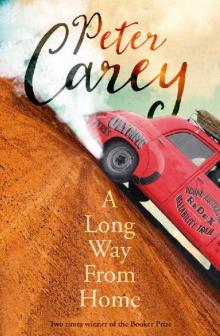 A Long Way From Home
A Long Way From Home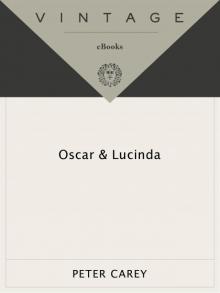 Oscar and Lucinda
Oscar and Lucinda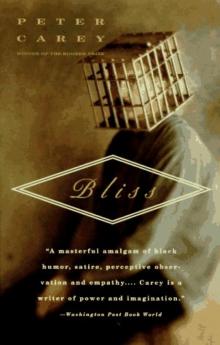 Bliss
Bliss Wrong About Japan
Wrong About Japan The Chemistry of Tears
The Chemistry of Tears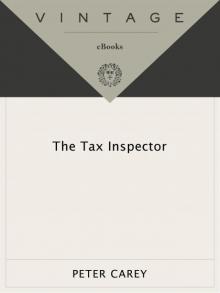 The Tax Inspector
The Tax Inspector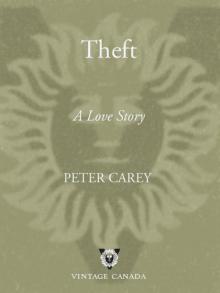 Theft: A Love Story
Theft: A Love Story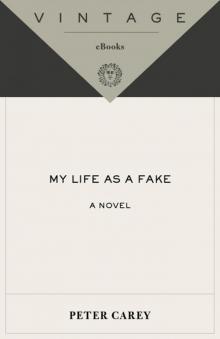 My Life as a Fake
My Life as a Fake Collected Stories
Collected Stories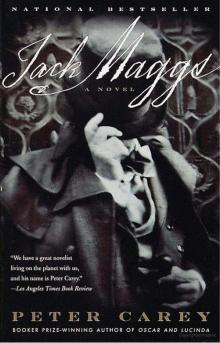 Jack Maggs
Jack Maggs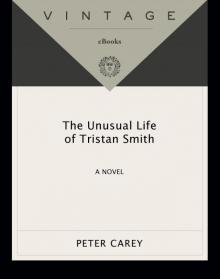 The Unusual Life of Tristan Smith
The Unusual Life of Tristan Smith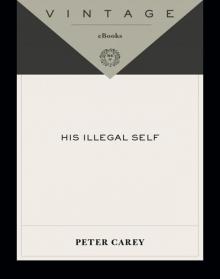 His Illegal Self His Illegal Self His Illegal Self
His Illegal Self His Illegal Self His Illegal Self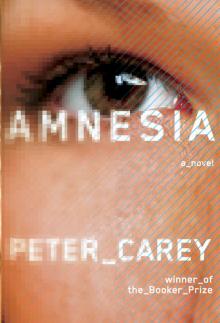 Amnesia: A Novel
Amnesia: A Novel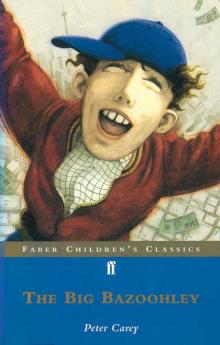 The Big Bazoohley
The Big Bazoohley 30 Days in Sydney
30 Days in Sydney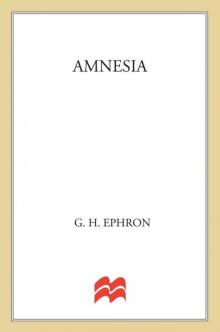 Amnesia
Amnesia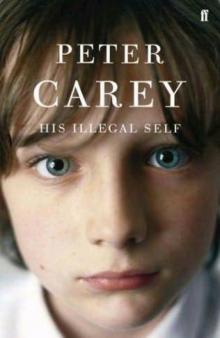 His Illegal Self
His Illegal Self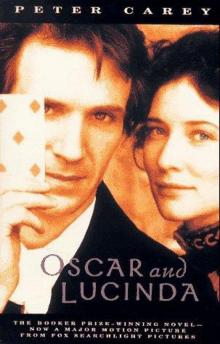 Oscar and Lucinda bw-1988
Oscar and Lucinda bw-1988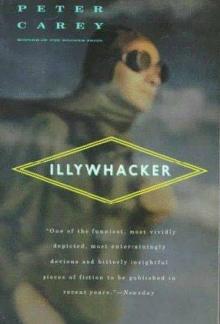 Illywhacker
Illywhacker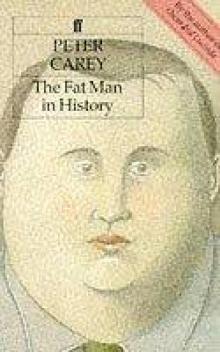 The Fat Man in History aka Exotic Pleasures
The Fat Man in History aka Exotic Pleasures